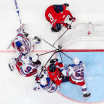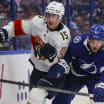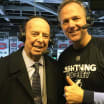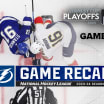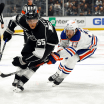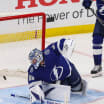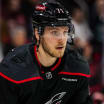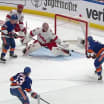NHL.com is providing in-depth analysis for each of its 30 teams throughout August. Today, the biggest reasons for optimism and the biggest questions facing the Washington Capitals.
There is a lot for the Washington Capitals to be happy about. Not many NHL teams have one of the top goaltenders in the League (Braden Holtby) and one of the most prolific goal-scorers in history (Alex Ovechkin), but the Capitals do. Despite a lack of success in the Stanley Cup Playoffs, the Capitals are trending upward.
Reasons for optimism, questions facing Capitals
Alex Ovechkin, Braden Holtby put Washington among Cup contenders despite playoff failures
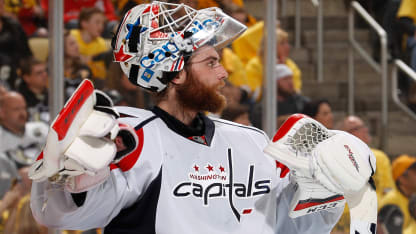
© Gregory Shamus/Getty Images
By
Katie Brown / NHL.com Correspondent
Along with the Pittsburgh Penguins and Tampa Bay Lightning, the Capitals are one of the most talented teams in the Eastern Conference, top to bottom. They don't have the glaring holes some other teams do and should go to the playoffs for the ninth time in 10 seasons.
Capitals 30 in 30: Season outlook | Top prospects | Fantasy outlook
Here are four reasons for optimism entering this season:
1. They are a legitimate Cup contender
Though the outcome last season wasn't what they hoped it would be, the Capitals only need to tinker to be even better. Adding secondary scoring and speed to the bottom six forwards were priorities this offseason, and they hope the additions of Lars Eller and Brett Connolly will boost production.
With the top six and goaltending set for at least next season, the Capitals can focus on smaller details that could put them over the top.
2. Braden Holtby
Holtby has improved tremendously under goalie coach Mitch Korn the past two years and last season it paid off when he tied an NHL record for wins (48) and won the Vezina Trophy.
He is 89-29-17 the past two seasons, 13 more wins than anyone else (Jonathan Quick of the Los Angeles Kings had 76), and his 2.21 goals-against average was tied for second while his .923 save percentage was tied for third among goalies who played at least 100 games.
Holtby, 27 on Sept. 16, will play for Team Canada at the World Cup of Hockey 2016.
3. Third-line center seems to be defined
Washington for years searched for a suitable second-line center and found Evgeny Kuznetsov, who had 20 goals and 57 assists (77 points) in 82 games last season. Suddenly it was the third line that was lacking one. Marcus Johansson, Mike Richards and Jay Beagle took turns playing there last season, but none was a long-term solution. The Capitals acquired Eller in an offseason trade with the Montreal Canadiens after having interest in him for more than a year.
"I'm going to have [consistency in] a certain spot in a certain place with a certain role that's going to be defined, and I think that ability is going to do me well, so I'm really excited," Eller said. "I think deep down I am a center, and that's where Washington sees me too."
4. Alex Ovechkin
The 30-year-old captain led the NHL in goals (50) for the sixth time and is the third player in NHL history to have at least seven 50-goal seasons. If he's slowed down a bit, it hasn't shown, and the motivation to win the Stanley Cup should provide ample fuel.
"Every year, lots of expectations," he said after the Game 6 loss to the Penguins. "Lots of great players, but something we're missing. This group of guys can do better than be in just the second round."
Here are three key questions facing the Capitals:
1. Can Braden Holtby repeat his Vezina season?
Holtby played 66 games last season and tied Martin Brodeur's record for wins in a season, helping the Capitals win the Presidents' Trophy. He recently said he was fighting a knee injury in the first round of the playoffs, though it is unclear when the injury occurred. The Capitals need to assess whether Holtby should play 60-plus regular-season games when he's needed to be sharp and fresh for the playoffs. Backup Philipp Grubauer can take on a larger role if they decide to reduce Holtby's workload.
2. Does the regular season matter?
Twice during the Ovechkin era the Capitals have won the Presidents' Trophy, but they have not advanced past the second round of the playoffs. They won 56 games last season but didn't play well after a snowstorm postponed two games just before the All-Star break in late January (21-10-5 after a 35-8-3 start).
General manager Brian MacLellan said the combination of the snowstorm and the break threw them off their rhythm and they were never quite able to get it back. Washington was the top team in the NHL for most of the season, so that could be chalked up to a lack of urgency, but it seemed to trickle into the playoffs, where the Capitals were eliminated in the Eastern Conference Second Round by the eventual champion Penguins.
"We probably got too far ahead and there wasn't that 'We need to do this, we need to do that,'" MacLellan said in May. "It was more, 'How do we get to the playoffs playing the right way?' [It] is hard to manufacture 'We need to be at our highest level right now' when we're No. 1 in the League. I guess in hindsight you'd want to spread it out a little bit better, but I don't think you're in control of that."
The challenge will be balancing regular-season success while maintaining a high level of play into the postseason.
3. What will Tom Wilson's role be?
Wilson transitioned to a more defensive role as a forward last season, playing on the penalty kill for the first time in his three-season NHL career. MacLellan expressed interest in developing Wilson into more of a net-front player, like Joel Ward, who played for Washington for four seasons before signing with the San Jose Sharks as an unrestricted free agent last year.
Wilson, 22, scored an NHL career-high seven goals last season and he'll be expected to play a larger offensive role in addition to his penalty-killing duties.
"It's on Tom and on us to turn him into that kind of guy that has a net-front presence, that finds loose pucks, finds rebounds, plays good along the wall," MacLellan said. "He's turned into a good penalty killer, more disciplined in his physical game. To get him to the next level, offense needs to become part of his game."

